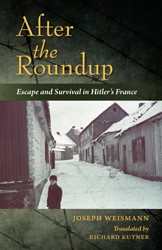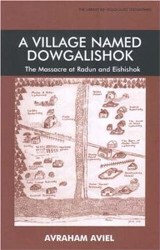Saul Friedlander’s two-part memory begins with his youth in France, at the resort two which his family (and servants) relocated from German-occupied Prague. Religiously unaffiliated and wealthy, Friedlander’s parents remained in France longer than many of their relatives, who left for Sweden, before deciding to flee to Switzerland. They placed their son in a Catholic seminary, where Friedlander eventually accepted his new life after a painful period of adjustment and decided to become a priest.
At the end of World War II, Friedlander approached a high-ranking mentor about his continuing his education and finding his parents. “Paul,” the priest answered, addressing Friedlander by his Catholic name, “your parents are dead.” It was the first time Friedlander ever heard about the Holocaust.
“For the first time,” Friedlander writes, “I felt myself to be a Jew.” He left the meeting agonizing over whether to continue on his intended career path or to cast his lot with the persecuted people from which he came.
Years later Saul realized that his stressful life as a child had rendered him emotionally starved, incapable of deep feeling. After moving to Israel, becoming a citizen and serving in the army, Friedlander wandered as an adult, visiting an uncle in Sweden for a time and enrolling at Harvard only to drop out. But once he returned to Israel, Friedlander concluded that his future lay in the field of historical research.
Beginning his work on the Holocaust period, Saul discovered a trove of relevant papers and learned that the Pope and his bishops had not tried to stop the mass murders of the Holocaust — in fact, the Pope had encouraged Hitler, regarding him as an ally against godless communism. He learned that Jewish councils had organized Germany’s Jews into groups for shipment to concentration and death camps; though his book on the subject was suppressed by the authorities and never published, he distributed his material to the students in his seminar course and engaged in discourse with German historians.
Some of the German historians Friedlander met with regretted the loss of the lives they had led under Hitler, and criticized the dominance of the practical, data-driven approach to their field introduced by their American and Israeli colleagues. “Did we know about the extermination of the Jews?” one woman admitted. “Of course we did. The newspapers kept publishing long lists of people who had been arrested, and all their names were Jewish. We knew something terrible was going on.” Besides, Friedlander learned, German soldiers wrote about the camps and transports in their letters, and talked about these horrors when they visited home on leave — and Hitler even mentioned the processes involved in several of his speeches.
Many of the German historians, Friedlander found, felt that the time for discussing the Holocaust was past, and some continued to believe in Hitler’s antisemetic conspiracy theories.
But Germans were not the only leaders incriminated through Friedlander’s research. Friedlander unearthed directives issued by Pope Pius XII to have baptized Jewish children returned to their homes from hiding. Friedlander found an encyclical of Pope Pius XI condemning Hitler’s treatment of the Jews, but learned that Pope Pius XII had smothered that message, replacing it with a friendly letter of approval, as long as no German troops were sent to Italy. Friedlander also learned that the Swiss were complicit, helping Nazi Germany financially by trading cash for the gold looted from Holocaust victims’ teeth, wedding rings, and other jewelry.
Friedlander’s memoir addresses his personal life outside of his historical work and experiences, as well. He underwent lengthy and intensive psychotherapy treatment, which helped him to some degree byt did not ultimately cure the trauma he suffered as a child survivor. He writes about building a home for his first wife and three children, including his parents-in-law, as well, and about his divorce and remarriage to another woman. Moving from place to place for so many years of his life, Friedlander determined that it was only in Europe that he felt comfort and acceptance, though he ended up retiring to the United States at the end of his life. Although he was never quite as ease in America as he felt elsewhere, when Friedlander remembers the troops that brought about an end to the horrors of Europe during his lifetime, all he has to write is “God Bless America.”
Related Content:
- Jonathan Kirsch: On the Question of Jewish Resistance and Herschel Grynszpan
- Franz Kafka: The Poet of Shame and Guilt by Saul Friedlander
- History on Trial by Deborah E. Lipsdadt





